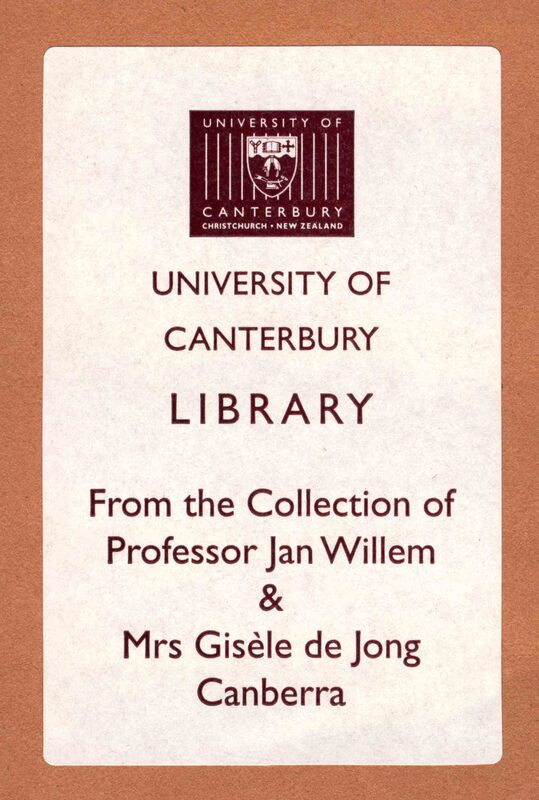Jan Willem de Jong
Jan Willem de Jong was born on 15 February 1921 in the Netherlands. He completed his undergraduate studies at the University of Leiden in 1945, with a major in Chinese and minors in Sanskrit and Japanese. In 1946 he continued his studies at Harvard University, and between 1947 and 1950 in Paris at the Collège de France and the Sorbonne. In Paris de Jong also met and married his wife Giselle. De Jong received his PhD from Leiden in 1949, with a thesis entitled “Cinq Chapîtres de la Prasannapadā,” written in French on the topic of Mahayana Buddhism. From 1950 to 1965 de Jong worked at the University of Leiden, first as a research assistant (1950-53), then as a lecturer (1953-56), and finally as the Netherland’s first Professor of Tibetan and Buddhist Studies (1956-65), based in the university’s Indological institute, the Instituut Kern. In 1957 de Jong co-founded the Indo-Iranian Journal with colleague F. B. J. Kuiper. The journal became a focal point of his career, and the outlet of much of his written work. He remained co-editor until 1998. In 1965 de Jong and his family relocated to Australia, where he took up the position of Professor of South Asian and Buddhist Studies at the Australian National University, Canberra. De Jong remained at the Australian National University until his retirement in 1986, and during his time there he served as both Head of the Department of South Asian and Buddhist Studies and Dean of the Faculty of Asian Studies. De Jong’s greatest area of specialty was Buddhist philology, and over his career he mastered a wide number of Asian and European languages, including Chinese, Japanese, Sanskrit, Pali, Classical Tibetan, Mongolian, French, German, Russian, Danish, and Italian, as well as English and his native Dutch. He produced over 800 publications, the majority of which were book reviews. Other significant publications from de Jong include A Brief History of Buddhist Studies in Europe and America, a series of papers first published in the 1970s, and collated, enlarged and republished in 1987 and 1997, and Tibetan Studies (1994). De Jong was an avid collector of books, and his library of over 10,100 volumes also now resides in the University of Canterbury Library. De Jong remained in Canberra after his retirement, and remained active in his field. He died on 22 January 2000.
Compiled by Dr Matthew Oram, 2014.
A sample of the de Jong collection
- A Tibetan-English dictionary, with special reference to the prevailing dialects; To which is added an English-Tibetan vocabulary. Jäschke, H. A. (Heinrich August), 1817-1883. London : K. Paul, Trench, Trubner & co. ltd., 1934.
- Taishō shinshū Daizōkyō. Takakusu, Junjirō, 1866-1945. Tōkyō : Taishō Issaikyō Kankōkai, Taishō 13-shōwa 7 [1924-1932]
- Mongolʹskaia︠ ︡khrestomatīia︠ ︡dlia︠ ︡pervonachal ńago prepodavanīia︠ ︡. Pozdneev, Alekseĭ Matveevich, 1851-1920. Sanktpeterburg : Tipografīia︠ ︡Imperatorskoǐ akademīi nauk, 1900.
- Le Bhâgavata Purâna; ou, Histoire poétique de Krichna. Burnouf, Eugène, 1801-1852. Paris : Imprimerie royale, 1840-98.
- Breviarium romanum : ex decreto ss. Concilii Tridentini restitutum. Catholic Church. Breviary. Tornaci : Typis Societatis S. Joannis Evangelistae, Desclée, 1884. Si-yu-ki ; Buddhist records of the Western World. Hsüan-tsang, 596 (ca.)-664. London : Trübner & Co., 1884.
- Tokumei Zenken Taishi Bei-O kairan jikki. Kume, Kunitake, 1839-1931. Tokyo : Hakubunsha, <1878 >
- Nágánanda, or, the Joy of the snake-world : a Buddhist drama in five acts. Harṣavardhana, King of Thānesar and Kanauj, fl. 606-647. London : Trübner & Co., 1872.
- Introduction à l'histoire du buddhisme indien. Burnouf, Eugène, 1801-1852. Paris : Imprimerie royale, 1844.
- Bytal-puchisi : or, The twenty-five tales of Bytal. Behadur, Kalee-Krishen. Calcutta : Sobha-Bazar Press, 1834.
- Geschichte der Ost-Mongolen und ihres fürstenhauses. Ssanang Ssetsen, Chungtaidschi. St. Petersburg : Gedruckt bei N. Gretsch; 1829.
- The Bhasha Parichheda and Siddhanta Muktavali ; an elementary treatise on the terms of logic, with its commentary. Viśvanātha Nyāyapancānana Bhaṭṭācārya. Bhāṣāpariccheda. Calcutta : Printed at the Education Press, 1827.
- The Mégha dúta; or, Cloud messenger: a poem in the Sankrit language. Kālidāsa. Calcutta : Printed by P. Pereira, at the Hindoostane Press, 1813.
- [Vaiyākaranasarvasva]. Dharaṇīdhara, fl. 1809. Calcutta : Srīmantāmasahendakahkulaburūvasāheba attājñayā, 1809.
- A grammar of the Sanscrit language. Volume 1. Colebrooke, H. T. (Henry Thomas), 1765-1837. Calcutta : Printed at the Honorable Co.'s press, 1805.
- Systema Brahmanicum liturgicum, mythologicum, civile. Paulinus, a S. Bartholomaeo, 1748-1806. Romae : apud A. Fulgonium, 1791.
- Mémoires pour servir a l'histoire de M. de Voltaire : dans lesquels on trouvera divers Ecrits de lui, peu connus, sur les différends avec J.B. Rousseau & d'autres Gens-de-Llettres : un grand nombre d'anecdotes : et une notice critique de ses Pieces-de-Theâtre. Servières, baron de. [Sevieres] Amsterdam : [s.n.], 1785.
- The Bhăgvăt-gēētā : or, Dialogues of Krĕĕshnă and Ărjŏŏn ; in eighteen lectures with notes. Wilkins, Charles, Sir, 1750-1836. London : Printed for C. Nourse, 1785.
- Réflexions critiques sur la poësie et sur la peinture. Dubos, abbé (Jean-Baptiste), 1670-1742. Paris : Chez Pissot, 1755.
- Fables choisies, mises en vers. La Fontaine, Jean de, 1621-1695. Amsterdam : Chez Pierre Mortier, 1705.
- Oeuvres diverses du sieur D*** : avec Le traité du sublime, ou du merveilleux dans le discours. Boileau Despréaux, Nicolas, 1636-1711. À Amsterdam : Chez Abraham Wolfgang, 1686.
- Le sage resolu contre l'une et l'autre fortune. Petrarca, Francesco, 1304-1374. A Bruxelle : Chez François Foppens, 1660-1661.
- Nicolai Machiavelli florentini Historiæ florentinæ libri octo. Machiavelli, Niccolò, 1469-1527. Hagæ : Apud Adrianum Vlacq, 1658.
- Titi Livii Patavini Historiarum libri. Livy. Amsterdami : Apud Guiljelm Blaeu, 1633.

